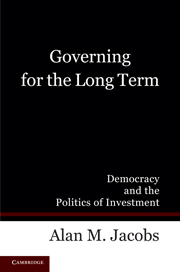
-
Select format
-
- Publisher:
- Cambridge University Press
- Publication date:
- 05 June 2012
- 28 March 2011
- ISBN:
- 9780511921766
- 9780521195850
- 9780521171779
- Dimensions:
- (234 x 156 mm)
- Weight & Pages:
- 0.59kg, 320 Pages
- Dimensions:
- (234 x 156 mm)
- Weight & Pages:
- 0.46kg, 324 Pages
You may already have access via personal or institutional login
Book description
In Governing for the Long Term, Alan M. Jacobs investigates the conditions under which elected governments invest in long-term social benefits at short-term social cost. Jacobs contends that, along the path to adoption, investment-oriented policies must surmount three distinct hurdles to future-oriented state action: a problem of electoral risk, rooted in the scarcity of voter attention; a problem of prediction, deriving from the complexity of long-term policy effects; and a problem of institutional capacity, arising from interest groups' preferences for distributive gains over intertemporal bargains. Testing this argument through a four-country historical analysis of pension policymaking, the book illuminates crucial differences between the causal logics of distributive and intertemporal politics and makes a case for bringing trade-offs over time to the center of the study of policymaking.
Reviews
“If you care about the future, read this book. Anyone who worries about receiving a pension check when they retire, hopes for investment in education for their children or grandchildren, or is concerned about the preservation of our environment, has to wonder why some elected governments impose short-term costs on their constituents to secure long-term social benefits while others do not. Alan Jacobs advances a theoretically rich argument about the circumstances under which governments make these kinds of policy investments for the future. This book is sophisticated, innovative, and insightful. It contributes to scholarly literatures on historical institutionalism, the politics of time, and the welfare state. But it also tells us something fundamentally important about the political world we inhabit.”
—Erik Bleich, Middlebury College
“Exhaustively researched and theoretically innovative, Governing for the Long Term represents a major leap forward in the study of comparative public policy. Jacobs goes far beyond existing work in carefully thinking about how our theories and conclusions are altered when policymaking is viewed not as a single distributive event, but as a stream of government actions whose effects are felt over long spans of time. Building on both rational choice theory and institutional analysis, Jacobs comes up with novel and sometimes counterintuitive conclusions. Given the number of long-term challenges facing democratic societies today—from global warming to population aging—Governing for the Long Term could not be more relevant.”
—Jacob S. Hacker, Stanley Resor Professor of Political Science, Yale University
“Alan Jacobs draws our attention to a critical yet unexamined aspect of public policymaking: how political actors address the temporal dimensions of policy choice. More specifically, Jacobs explores the conditions under which policy actors accept short-term pain for long-term gain. His book sheds new light on pension policy and on the politics of welfare state formation and retrenchment more generally. Governing for the Long Term is a considerable achievement.”
—Adam Sheingate, Johns Hopkins University
“All governments are faced with the dilemma that satisfying citizen’s short-term desires often conflicts with society’s long-term interests. In other words, the politics of who gets what can also be a battle over when they get it. Focusing on these inter-temporal tradeoffs, Alan Jacobs brilliantly shows how distributive battles are not only between groups, but also over time. Analyzing the politics of social security in four countries Governing for the Long Term thus makes a major contribution both to our understanding of this important policy arena and to a more basic understanding of the politics.”
—Sven Steinmo, European University Institute
“Governing for the Long Term offers an original and stimulating framework for understanding how politicians make decisions in sectors where costs and benefits play out over an extended period of time. This book will help analysts of politics not only to develop better explanations of political phenomena, but also to think differently about what it is that they are explaining.”
—R. Kent Weaver, Georgetown University
Contents
Metrics
Altmetric attention score
Full text views
Full text views help Loading metrics...
Loading metrics...
* Views captured on Cambridge Core between #date#. This data will be updated every 24 hours.
Usage data cannot currently be displayed.
Accessibility standard: Unknown
Why this information is here
This section outlines the accessibility features of this content - including support for screen readers, full keyboard navigation and high-contrast display options. This may not be relevant for you.
Accessibility Information
Accessibility compliance for the PDF of this book is currently unknown and may be updated in the future.


